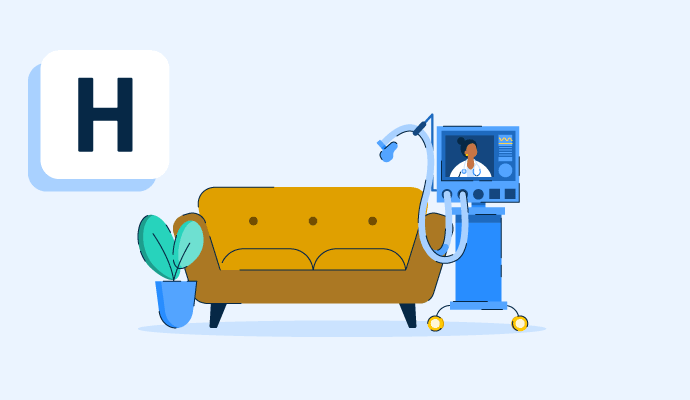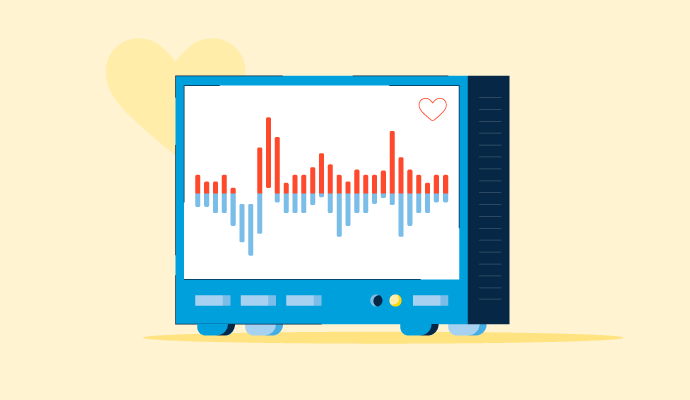What is home health care?
Home health care is the wide range of technical and supportive medical care provided in the comfort of a patient’s home after an illness or injury. Caregivers are usually licensed healthcare professionals, such as nurses, therapists, and home health aides.
A doctor typically prescribes this type of care for patients who require continuous medical attention or for those recovering from a hospitalization or surgery. It helps the patients meet their daily needs and avoid unnecessary admission to the hospital. In-home care is also for people with disabilities or chronic illnesses and the elderly.
The services can be short-term or long-term care, depending on the patient’s needs. Some examples of home health care services are wound care, medication management, intravenous line (IV) therapy, and pain management.
Demand for home health care services is growing fast because it’s considered a cost-effective and convenient alternative to receiving care in a hospital or an in-patient rehabilitation center. Home health agencies use home health care software to track and coordinate services provided by their aides.
In the United States, home health care is covered under Medicare and Medicaid, the US federal and state government’s health insurance programs. Patients need to meet certain eligibility conditions. For instance, patients must be receiving services from Medicaid or Medicare-certified agencies to be covered under these plans.
Types of home health care services
Home health care providers offer a wide array of care that differs with regard to the type of care provided and the degree of physician involvement. This ranges from physician house calls and skilled nursing to even “hospital-at-home” services. Home health care service providers often consult with the patient’s doctors and devise a plan of care together.
- Doctor in-house calls: Doctors assess and treat an illness or follow up on patients in their homes instead of the hospital or nursing home. A house call spares the patients from the physical discomfort and psychological distress of travel.
- Skilled nursing care: A doctor prescribes in-home nursing for patients who are discharged from the hospital but still need preventative, therapeutic, or rehabilitative care. Either a registered nurse (RN) or a licensed practical nurse (LPN) acts as a caregiver here. Skilled nursing care includes medication administration, pain management, wound dressing, catheter care, feeding tube care, ostomy/gastrostomy care, ventilator care, and vital sign monitoring.
- Occupational therapy: Doctors prescribe occupational therapy to help people recover skills they may need for daily life and work, like eating or bathing, after an illness or injury, or if they have a disability. Occupational therapy is also provided to patients with chronic health conditions that can be managed with certain changes in daily activities. Occupational therapy is recommended for diabetes, heart-related diseases, stroke, dementia, Alzheimer’s disease, arthritis, cerebral palsy, and Parkinson’s disease.
- Physical therapy: A patient whose functional mobility is limited because of an injury or illness benefits from physical therapy. Conditions for which at-home doctors prescribe physical therapy for post-surgical conditions like a total hip or total knee replacement or after trauma, like a fracture.
- Speech therapy: This is suggested for clients with problems with swallowing, speech, language, voice, and cognition. After consultation with their health care provider, speech therapists help patients with their diets, teach them safe swallow strategies, and train them on oral motor and other pharyngeal exercises.
- Care by home health aides: This service is provided for people who cannot perform basic daily activities on their own. Home health aides help patients with personal care activities like bathing, feeding, dressing, and grooming, as well as health-related services like monitoring vital signs or medicine management. The aides usually work under the supervision of an RN, physician, or social worker. Some home health aides also help with household chores to a certain extent.
- Medical social service: Under this service, medical social workers provide emotional support and resources to recovering patients or under care at home. They assess a client’s illness and needs and assist the patient and their family get the required resources.
- Home diagnostic services: Patients with limited mobility or a weak immune system benefit from home diagnostic services. Laboratory technicians come to the patient’s home and collect the required samples for diagnostic tests like blood tests or urine tests. In some cases, they even bring portable medical equipment like X-ray machines to perform the tests. It saves the patient the inconvenience of traveling to a health care center.
It should be noted that there are specific eligibility criteria that the patients must meet to get rehabilitation therapy like speech, occupational, or physical therapy at home under Medicare, Medicaid billing, or any other private insurance.
Benefits of home health care
Home nursing care improves the quality of the patient experience by providing professional assistance to patients in the comfort of their own homes. It also reduces the potential of infections and other preventable adverse health events that may occur in hospitals. Some of the other advantages of home health care are below.
- Home health care is cost-effective. Home health care eliminates long hospital stays and travel as well as related expenses. With support from government insurance programs like Medicare or Medicaid, home health care becomes more affordable than institutional care.
- Home care provides individual attention. The service ensures complete attention to the individual with one-on-one interaction, offering more personalized care than in hospital or institutional settings.
- Family caregivers get peace of mind. Support from skilled medical professionals like nurses and health aides for loved ones relieves some of the burdens and stress of family caregivers.
- Home health aides offer additional support and connectedness. In addition to the services given, care professionals provide much-needed companionship to patients and decrease loneliness and isolation.
Home healthcare best practices
Home health agencies stick to the following best practices to provide superior patient care.
- They keep digital records. They make sure to keep patient records accessible to caregivers and other stakeholders by maintaining digital track records of all information. It reduces the burden of paperwork, minimizes errors, and avoids duplication.
- They use the right tech tools. Keeping track of all communication and care services provided to multiple patients is a difficult task. To manage this, agencies should use tools like electronic health record software to document and maintain patient records and home health care software to coordinate and schedule services as per client needs. This saves time for agencies and also helps aides focus on providing meaningful care services to their clients.
- They adopt monitoring systems. Home health care agencies use real-time health monitoring systems that allow aides to track patients’ vital signs. This improves safety, as well as ensures high-quality care from doctors without having to do frequent visits. Agencies can use monitoring devices like digital wristbands that automatically alert for emergency intervention when needed.
Home health care vs. home care
Home health care includes medical services offered by licensed professionals in consultation with a doctor or a health care provider. Insurance programs like Medicare and Medicaid can sometimes cover their expenses.
Home care includes a range of non-medical services provided primarily to aid older adults with their daily activities and personal care. It’s often paid out of the client’s own pocket.
Want to explore more? Learn about electronic health record software and how it helps home care providers maintain their patients' records digitally.

Soundarya Jayaraman
Soundarya Jayaraman is a Content Marketing Specialist at G2, focusing on cybersecurity. Formerly a reporter, Soundarya now covers the evolving cybersecurity landscape, how it affects businesses and individuals, and how technology can help. You can find her extensive writings on cloud security and zero-day attacks. When not writing, you can find her painting or reading.











